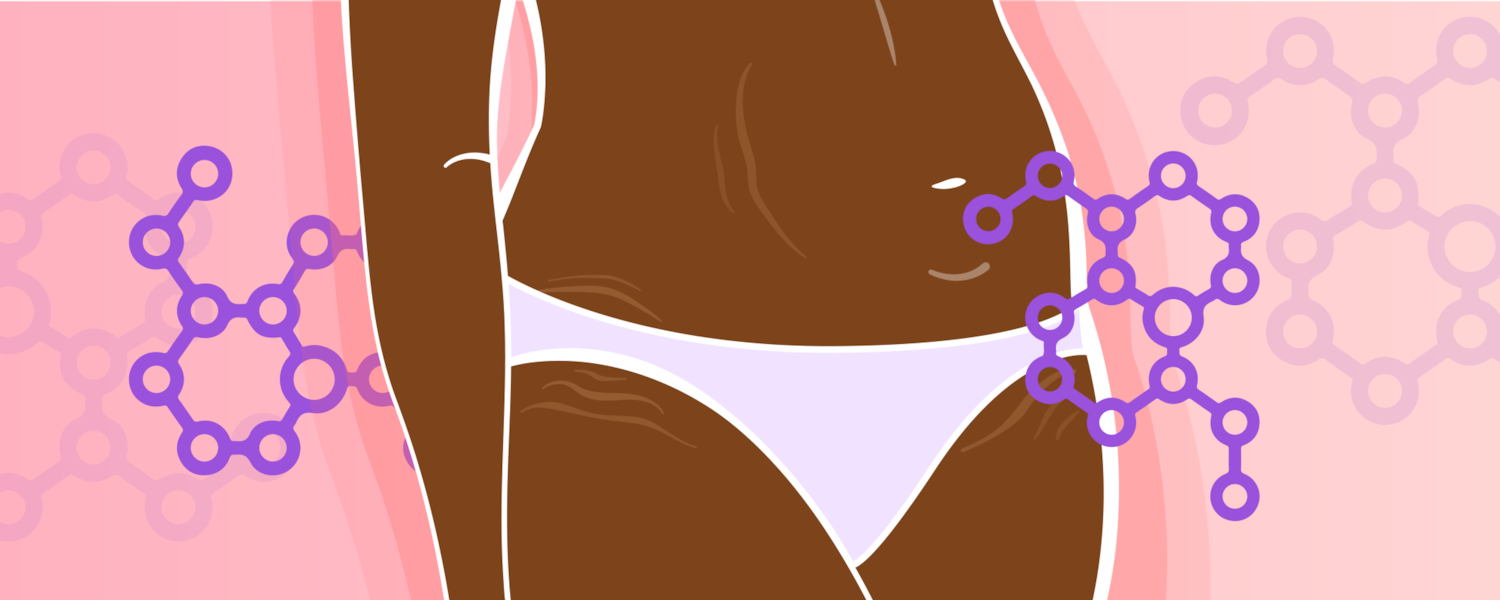What’s up with hormonal changes around menopause?

Most of us have heard of the hot flushes, irregular bleeding, and night sweats that are typical of menopause. But did you know it's all to do with hormones? Learn how hormone levels change your body in the time leading up to, during, and after menopause.
Menopause is when our bodies go through hormonal changes — usually between the age of 45 and 55 — which affect our menstrual cycle. In a nutshell, we eventually stop ovulating, and — to the joy of some and the dread of others — our periods stop completely.
Many women+ start to notice changes in their bodies (like hot flushes, irregular periods, or even brain fog) before they stop menstruating for good. And noticing these changes is not always easy to deal with. Whether you're happy to bid period pads and tampons farewell or nervous about what's to come (or both!), those feelings are completely normal and valid — we all have them as we go through our menopause journey. And understanding exactly what’s going on in your body can help you feel better prepared for it.
What happens to our hormones before menopause?
To the surprise of many of us, the effects of menopause come a bit before menopause itself.
During perimenopause (the period of time just before menopause), our ovarian function changes. This means that our ovaries stop producing eggs, and they make less oestrogen and progesterone (often referred to as the 'female hormones') — the dynamic duo that control menstruation. Think of it like the opposite of puberty, when our bodies started producing more hormones.
Because of this decrease in oestrogen and progesterone, our menstrual cycles change, and our periods can become irregular before they stop once and for all. During perimenopause, it's normal to experience anything from light spotting to heavy periods. The rule of thumb is that you officially reach menopause once you haven't had a menstrual flow for 12 months in a row.
How do hormonal changes affect my body during perimenopause?
During the transition to menopause, your body tries to adjust to fluctuating hormone levels, which can lead to some physical changes and symptoms. These are all completely normal, and most of us will experience them at some point leading up to and during menopause.
Perimenopause headaches
Some women+ might experience more frequent and more intense headaches during this time. These are often known as hormone headaches (which, by the way, we can also get because of our period, during pregnancy, or when using hormonal birth control).
As your hormone levels drop, it’s common to experience more frequent and more intense headaches. Usually, this is nothing to worry about, as they should stop after menopause. So, if you feel a headache starting to kick-in, resting in a quiet, dark place and taking an over-the-counter painkiller should do the trick.
But if you do notice that your headaches are getting in the way of your daily life, you might want to reach out to your doctor. They will be able to reassure you and help you find the best treatment option if needed.
Perimenopause breast changes
As you approach menopause, you might notice that your boobs don't look or feel the same as they once used to — but this is very common!
Basically, the hormone oestrogen keeps the connective tissues in our breasts hydrated and elastic. [2] So, as the levels of this hormone in our bodies decrease, our breasts can shrink or lose their shape. Sometimes this can also make our boobs hurt or feel uncomfortable.
Seeing our body change in unexpected ways can make many of us feel anxious or upset – it’s taken a lifetime to get used to it, after all! But try to be kind to yourself and remember we’re not all supposed to look one certain way, especially not forever. Unfamiliar as the image in the mirror may seem, you are still you. Your body has done amazing things that got you this far in life, it deserves some credit, doesn’t it?
And there are a few things you can do to prevent breast tenderness. Try eating a healthy diet with lots of vegetables and avoiding caffeine (yes, that sadly includes your favourite comfort chocolate). You might also want to wear loose clothing and a well-fitting bra to give your boobs support.
Whichever way you choose to deal with how your breasts are changing, keep in mind that the discomfort won’t last forever, it should go away post-menopause.
Perimenopause bleeding
Because of the hormonal fluctuations during perimenopause, our menstrual cycles can become irregular. And what that means is different for everyone. Basically, anything from unexpected spotting to experiencing heavier periods and lighter ones too. It’s a bit of a lottery!
Unfortunately, there's not much you can do about irregular periods other than going with the flow. That’s why it’s so important to be ready for any situation. An easy solution is to get into the habit of wearing daily liners, like our Bodyform All Fluid Protection liners. They’ll help you feel dry and confident throughout the day, no matter what comes your way. And if you feel like you can't get a grip on your cycle, why not go for a pair of period pants? They look just like regular underwear but are designed to absorb whatever flows your body throws at them — from menstruation to daily vaginal discharge and everything in between.
Perimenopause discharge
Oestrogen and progesterone tell the glands inside our vaginas to produce discharge. During perimenopause, when our hormone levels are a bit all over the place, you might notice that your discharge changes colour or consistency.
Experiencing clear, creamy, or white discharge is perfectly normal during this time (and is always), but you might also notice it taking on a brownish tint. Brown discharge is quite common during the time leading up to menopause. And although it might seem unsettling, this is usually nothing to worry about — just a bit of leftover period blood mixed with your daily discharge. But if you start getting yellow discharge, watch out! It could be a sign of desquamative inflammatory vaginitis (DIV).
Try not to worry, though. DIV symptoms tend to go away in a few days with prescribed antibiotics. So, with a bit of help from your doctor, you can go back to feeling confident in your V-Zone in no time.
After menopause, once our oestrogen levels have settled, our vaginas tend to produce less discharge. [3] So noticing a drastic decrease to your usual amount of discharge is also perfectly normal.
What are some of the other effects of hormonal changes?
- Hot flushes
- Mood swings
- Menstrual irregularity and vaginal bleeding
- Pain during intercourse
- Reduced sexual desire
- Dry skin
Disrupted sleep cyclesSome menopausal people find that using vaginal moisturizers or lubricant gives them relief from vaginal symptoms like dryness or pain during sex . And little things like exercising regularly, eating healthy, or something as simple as dressing in layers can keep you feeling good physically and mentally during the menopause transition.
Discover more tips and tricks for coping with the hormonal changes your body goes through before, during and after menopause by signing up to our newsletter .
Is it normal to bleed after menopause?
Postmenopausal bleeding can happen and is usually not a cause for concern, but it's worth keeping an eye on and getting it checked out by your doctor. Basically, after we go through menopause, our womb lining can become thinner and inflamed because of lower oestrogen levels. This is known as vaginal atrophy and can lead to bleeding after menopause. But bleeding can also be caused by a thickened womb lining from hormone replacement therapy or by cervical polyps (usually harmless growths in the cervix). [4]
In either case, it's a good idea to reach out to a healthcare professional if you notice any signs of bleeding after menopause. Although it's most likely nothing to worry about, they will be able to find out for sure — and being extra cautious never hurt anyone!
Where does oestrogen come from after menopause?
Before menopause, it's mainly our ovaries that make oestrogen. Around the time of menopause, our ovaries gradually produce less of this hormone until they completely stop.
But our bodies continue to make small amounts of oestrogen, just differently. The way they do it is by changing a hormone called androgen (found in our adrenal glands and sometimes referred to as the 'male hormone') into oestrogen with the help of a third hormone found in our fatty tissue called aromatase. That’s how good our bodies are at adapting to change! [5]
Can you get pregnant after menopause?
Although getting pregnant during the time after menopause is very rare, it is not unheard of. There have been some instances of postmenopausal women+ getting pregnant naturally [6], but most can only get pregnant through in vitro fertilisation (IVF).
As there’s no ovulation after menopause (and no longer any eggs released for fertilisation), many either opt for using donor eggs or previously frozen eggs for IVF. Those who try to have a baby after menopause usually also need hormone therapy to prepare their bodies for implantation (the process of a fertilised egg attaching itself to the uterus lining) and pregnancy.
So, make sure to reach out to your doctor or fertility specialist if you are trying to have a baby post-menopause. They are there to help and advise you on the best options for your specific needs and circumstances.
Medical disclaimer
The medical information in this article is provided as an information resource only, and is not to be used or relied on for any diagnostic or treatment purposes. Please consult your doctor for guidance about a specific medical condition.
[References]
[2] Do breasts undergo changes with menopause?
[3] Perimenopause and discharge: what to expect
[5] Menopause and oestrogen production
[6] Mirsafi R, Attarha M. Postmenopausal Pregnancy: A Case Report. Iran J Nurs Midwifery Res. 2020 Apr 18;25(3):260-262. doi: 10.4103/ijnmr.IJNMR_94_19. PMID: 32724774; PMCID: PMC7299412.


